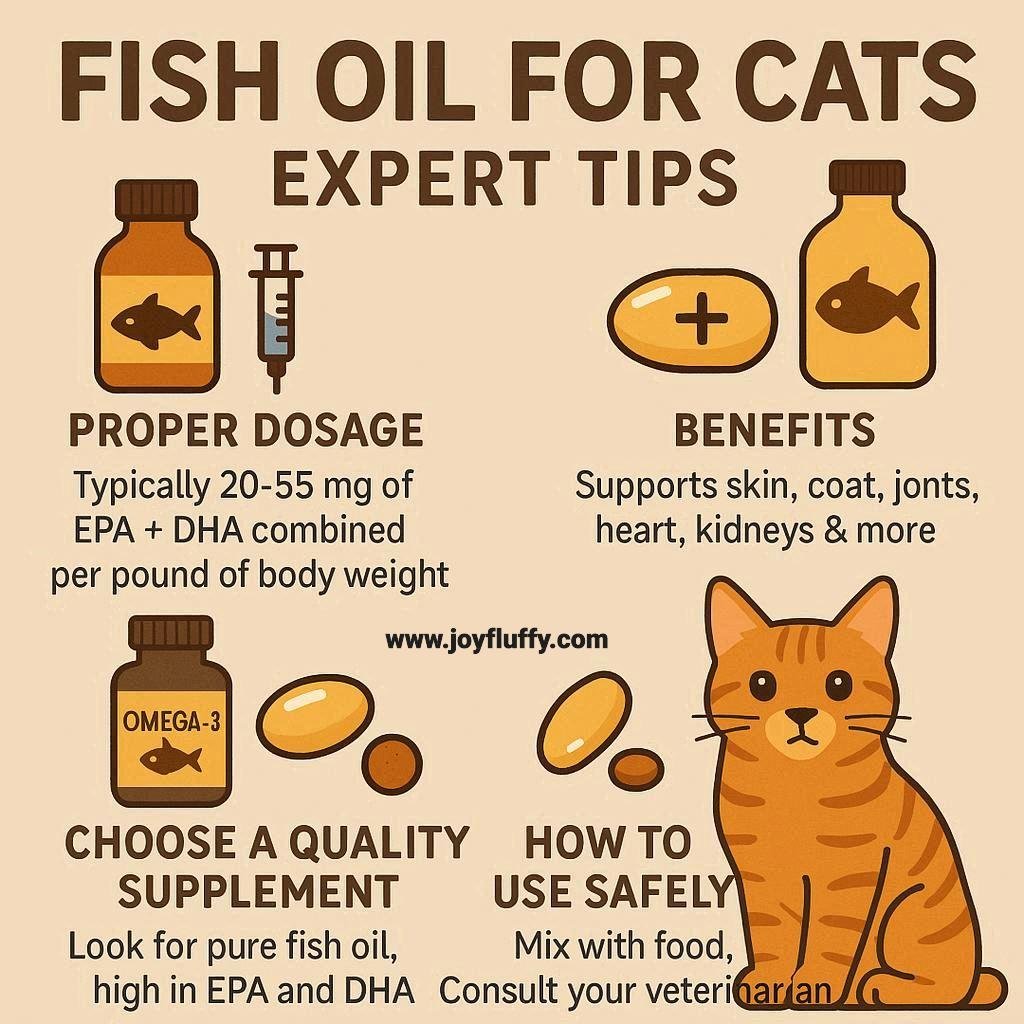Top Tips for Using Fish Oil for Cats

Top Tips for Using Fish Oil for Cats
Every cat owner wants to give their feline friend the best possible nutrition. You’ve probably heard about the amazing health benefits of fish oil for humans, but did you know that fish oil for cats can be just as beneficial?
Fish oil is a rich source of omega-3 fatty acids, particularly EPA (eicosapentaenoic acid) and DHA (docosahexaenoic acid). These essential fatty acids play crucial roles in maintaining your cat’s overall health, from supporting a shiny coat to promoting heart and brain function.
While cats can produce some omega-3s naturally, they often don’t get enough from their regular diet alone. This is where high-quality fish oil supplements can make a real difference in your pet’s wellbeing.
Key Takeaways
- Fish oil provides essential omega-3 fatty acids that support cat health
- Benefits include improved coat quality, joint health, and immune function
- Always consult your veterinarian before starting any supplement regimen
- Choose high-quality, cat-specific fish oil products for best results
- Proper dosage is crucial – more isn’t always better
- Monitor your cat for any adverse reactions when introducing fish oil
Benefits of Fish Oil for Cats
Skin and Coat Health
One of the most noticeable benefits of fish oil for cats is improved skin and coat condition. Omega-3 fatty acids help reduce inflammation and support healthy skin cell function. This can lead to a shinier, softer coat and may help reduce excessive shedding and dry, flaky skin.
Joint Support and Mobility
As cats age, they may develop arthritis or other joint issues. The anti-inflammatory properties of omega-3s can help reduce joint inflammation and support better mobility. This is particularly beneficial for senior cats or those with existing joint conditions.
Heart and Cardiovascular Health
Omega-3 fatty acids support cardiovascular health by helping to regulate blood pressure and reduce inflammation in blood vessels. According to PetMD, these benefits can be particularly important for cats with heart conditions.
Brain Function and Cognitive Health
DHA is especially important for brain health and cognitive function. Regular supplementation may help support mental sharpness in senior cats and aid in proper brain development in kittens.
Immune System Support
Omega-3 fatty acids play a role in regulating immune system responses, potentially helping your cat fight off infections and maintain overall health.
How to Choose High-Quality Fish Oil
Look for Cat-Specific Products
While human fish oil supplements exist, it’s best to choose products specifically formulated for cats. These products are designed with feline nutritional needs in mind and avoid ingredients that might be harmful to cats.
Check the Source and Purity
High-quality fish oil should come from reputable sources and undergo purification processes to remove contaminants like heavy metals and toxins. Look for products that provide third-party testing certificates.
Examine the EPA and DHA Content
Check the label for specific amounts of EPA and DHA per serving. A good omega-3 for cats supplement should clearly list these important fatty acid concentrations.
Consider the Form
Fish oil supplements come in various forms including liquid, capsules, and flavored treats. Choose the form that will be easiest for you to administer and most appealing to your cat.
Proper Dosage and How to Give It
Understanding Cat Fish Oil Dosage
Determining the correct cat fish oil dosage depends on your cat’s weight, age, and health status. Generally, cats need much smaller doses than dogs or humans. Most veterinarians recommend approximately 20-55mg of combined EPA and DHA per pound of body weight daily.
| Cat Weight | Recommended Daily Dose (EPA + DHA) |
|---|---|
| 5-8 lbs | 100-200mg |
| 9-12 lbs | 200-300mg |
| 13-16 lbs | 300-400mg |
Administration Tips
Start with a smaller dose and gradually increase to the recommended amount over several days. This helps your cat’s digestive system adjust. You can mix liquid fish oil into wet food, puncture capsules and squeeze the contents over food, or use fish oil-infused treats.
Always give fish oil with food to improve absorption and reduce the risk of stomach upset.
Safety, Side Effects, and When to See a Vet
Potential Side Effects
While fish oil is generally safe for cats, some may experience mild side effects, especially when first starting supplementation or if given too much. Common side effects include:
- Digestive upset (diarrhea or loose stools)
- Fishy breath or body odor
- Increased bleeding time (important if surgery is planned)
- Weight gain if given in excess
When to Consult Your Veterinarian
Always talk to your vet before starting any new supplement. This is especially important if your cat has existing health conditions, takes medications, or is pregnant or nursing. The ASPCA recommends professional guidance for all pet supplements.
Contact your veterinarian immediately if you notice persistent digestive issues, signs of allergic reactions, or any concerning changes in your cat’s behavior or health after starting fish oil.
Common Mistakes to Avoid
- Using Human Supplements: Human fish oil supplements may contain additives or concentrations that aren’t appropriate for cats. Stick to pet-specific products for safety.
- Overdosing: More isn’t always better with fish oil for cats. Excessive amounts can lead to vitamin E deficiency, digestive issues, and other health problems.
- Ignoring Storage Requirements: Fish oil can become rancid quickly if not stored properly. Keep supplements in cool, dark places and check expiration dates regularly.
- Stopping Vet Consultation: Even natural supplements can interact with medications or health conditions. Always keep your veterinarian informed about any supplements you’re giving your cat.
Alternatives and Complementary Supplements
- Algae-Based Omega-3s: For cats with fish allergies, algae-based omega-3 supplements can provide similar benefits without the fish protein that may trigger reactions.
- Flaxseed Oil: While not as efficiently used by cats as fish oil, flaxseed oil contains omega-3 ALA (alpha-linolenic acid) and can be an alternative for some cats.
- Complementary Nutrients: Vitamin E is often included in quality fish oil supplements as it helps prevent rancidity. Some products also include additional nutrients like vitamin D or antioxidants for enhanced benefits.
Pros and Cons
Pros
- Supports healthy skin and shiny coat
- May reduce joint inflammation and improve mobility
- Supports heart and brain health
- Generally well-tolerated by most cats
- Available in multiple convenient forms
- Can complement existing veterinary treatments
Cons
- Requires consistent daily administration
- Can cause digestive upset in some cats
- Quality products can be expensive
- May interact with certain medications
- Requires proper storage to prevent rancidity
- Results may take several weeks to become noticeable
Conclusion
Adding high-quality fish oil for cats to your feline’s diet can provide numerous health benefits when used correctly. From supporting a lustrous coat to promoting joint health and cognitive function, omega-3 fatty acids are valuable nutrients that many cats don’t get enough of from food alone.
Remember that every cat is unique, and what works for one may not work for another. Start slowly, monitor your cat’s response, and maintain open communication with your veterinarian throughout the process.
At JoyFluffy, we’re committed to helping you make informed decisions about your pet’s health and nutrition. Explore our other articles and resources to learn more about keeping your feline friend happy and healthy for years to come.
#JoyFluffy #PetCare #PetTips
Frequently Asked Questions
Can I give my cat human fish oil supplements?
It’s not recommended to give cats human fish oil supplements. Human formulations may contain ingredients that are harmful to cats or have concentrations that aren’t appropriate for feline needs. Always choose cat-specific fish oil products.
How long does it take to see results from fish oil supplementation?
Most cats begin showing improvements in coat quality and skin health within 4-6 weeks of consistent fish oil supplementation. Joint health benefits may take 8-12 weeks to become noticeable.
Can kittens take fish oil supplements?
Healthy kittens eating a complete and balanced diet typically don’t need fish oil supplements. However, your veterinarian may recommend them in specific circumstances. Always consult with your vet before giving any supplements to kittens.
What should I do if my cat refuses to take fish oil?
Try mixing liquid fish oil into wet food, using fish oil-infused treats, or choosing a different form of supplement. Start with very small amounts to help your cat adjust to the taste. Some cats prefer salmon oil over other fish oils.
Are there any cats that shouldn’t take fish oil?
Cats with fish allergies, certain bleeding disorders, or those scheduled for surgery should avoid fish oil supplements. Cats on blood-thinning medications may also need special consideration. Always consult your veterinarian first.
How should I store fish oil supplements?
Store fish oil supplements in a cool, dark place away from heat and light. Refrigeration can help extend shelf life for liquid forms. Always check expiration dates and discard any supplements that smell rancid or have changed color.





